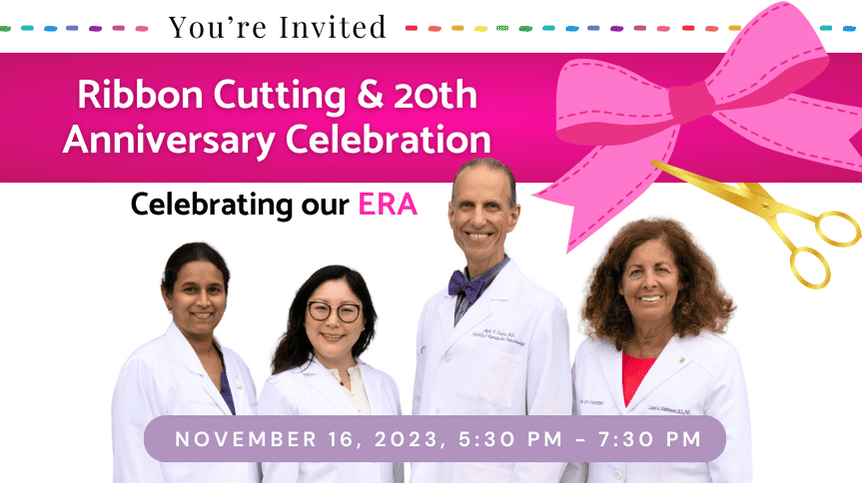
Infertility affects 1 in 8 couples and women/couples often seek fertility supplements during their journey if their attempts at conception have been unsuccessful.
Mark P. Trolice, M.D., FACOG, FACS, FACE, Board Certified Reproductive Endocrinology and Infertility Specialist and Director of The IVF Center, advises caution in these cases, but does have some effective recommendations for fertility supplements that actually work.
What Are Fertility Supplements?
Fertility supplements are dietary nutritional supplements designed to boost the body’s ability to conceive. It’s important to note that over the counter products intended to “boost” fertility are not regulated by the Food & Drug Administration (FDA) and many fertility supplements lack the scientific rigor necessary to prove their efficacy.
Research by the Center for Science in the Public Interest (CSPI) found that many dietary supplements that promoted to boost fertility actually offered no evidence to support their claim. In 2019 the CSPI asked the FDA and the Federal Trade Commission (FTC) to go after the manufacturers of these supplements for marketing unapproved drugs.
For this reason, Dr. Trolice and his team urge caution before taking when adding any vitamin or supplement that advertise to support fertility. While medications are required to undergo extensive clinical testing before being released to the public, there are no such rules governing the vitamin supplement industry.
Any time an herbal supplement is added to your diet, particularly during the delicate process of fertility treatment, the possibility of negative interactions with doctor-prescribed hormones and drugs medications to boost conception, are possible. Excessive doses of supplements can cause side effects such as:
- Blurry vision
- Headaches
- Nausea and vomiting
- Rash
Which Fertility Supplements Really Work?
 Dr. Trolice recommends just a handful of supplements to consider during your fertility journey. These supplements are taken under careful supervision to enhance and not counteract the fertility medications prescribed and administered during an infertility treatment regimen.
Dr. Trolice recommends just a handful of supplements to consider during your fertility journey. These supplements are taken under careful supervision to enhance and not counteract the fertility medications prescribed and administered during an infertility treatment regimen.
Typically, Dr. Trolice recommends some or all of the following fertility supplements.
CoQ 10
The antioxidant Coenzyme Q10 (CoQ10) is one of the body’s essential nutrients. CoQ10 is an antioxidant that supplies some of the energy needed for cell production. There is evidence that CoQ10 supplements can lower blood pressure and treat heart conditions. There are even some preliminary studies that show CoQ10 may slow the progression of Alzheimer’s disease.
During fertility medication cycles, ovarian stimulating medication is used to produce more than one egg from the ovary. In women with diminished ovarian reserve (DOR), ovarian stimulation often results in a low number of eggs thereby reducing the success rate with in vitro fertilization (IVF). The antioxidant Coenzyme Q10 (CoQ10) has been studied in women with DOR with encouraging results of increasing the ovarian response to stimulating medication.
DHEA
The adrenal glands (hormone-producing organs next to the kidney) produce a weak male hormone called dehydroepiandrosterone, or DHEA that helps in the production of other hormones, including the body’s sex hormones, testosterone and estrogen. There are studies that show DHEA may help with everything from slowing the aging process to reducing depression, but more research needs to occur.
As with CoQ 10, there are some studies to support the use of DHEA prior to ovarian stimulation for IVF to improve egg production in women with diminished ovarian reserve. pre-treatment cycle to enhance the ovarian response to fertility medication. Treatment up to to eight weeks is recommended prior to determining any benefit to DHEA.
Prenatal Vitamins/Folic Acid
Folic acid or folate, is a B vitamin critical to the health of pregnant women. In fact, of all the areas to address before conception, the simplest and one of the most supported by scientific evidence is the use of folic acid during pregnancy. Unfortunately, it’s hard to get as much folic acid from food alone so The IVF Center always recommends supplementing as part of fertility care.
The American College of Obstetricians and Gynecologists (ACOG) and the U.S. Centers for Disease Control and Prevention (CDC) recommends 0.4mg of folic acid daily beginning one month prior to conception attempts and to continue throughout the pregnancy. Folic acid has been shown to reduce the risk of major birth defects of the fetal brain and spine called neural tube defects. Prenatal vitamins contain the minimal recommended amount of folic acid and there is some evidence that shows this supplement can possibly improve the fertility rate.
Iron
In addition to folic acid during and before pregnancy, a pregnant woman needs about double the iron than a non-pregnant woman. Your body uses iron to make the extra blood that you and the baby need during pregnancy. The daily amount needed typically is 27 mg, which you’ll find in most prenatal vitamins.
However, it’s never a bad idea to bulk up on iron-rich foods during infertility treatments and pregnancy, such as:
- Beans
- Enriched breakfast cereals
- Fish
- Lean red meat
- Lentils
- Poultry
- Prune juice
Also consider eating foods that help you absorb iron, such as broccoli, grapefruit, orange juice, peppers, and strawberries.
Calcium
Calcium is also needed during pregnancy to build the baby’s bones and teeth. All women, including pregnant women, aged 19 years and older should receive 1,000 mg of calcium each day. Food sources with calcium include milk and other dairy products, such as cheese and yogurt. For women who cannot tolerate milk, other sources are broccoli; dark, leafy greens; sardines; or a calcium supplement.
Vitamin D
Vitamin D works with calcium to help baby’s bones and teeth develop. It also is essential for healthy skin and eyesight. If vitamin D levels are low, the cells in the uterus and ovaries can be negatively affected. When pregnant, a lack of vitamin D contributes to gestational diabetes and hypertension.
All women, including those who are pregnant, need 600 international units of vitamin D per day. Good sources are milk fortified with vitamin D and fatty fish such as salmon. Sunlight exposure also converts a chemical in the skin to vitamin D. However, few foods provide enough vitamin D, and if enough sunlight isn’t available, vitamin D supplements are recommended.






